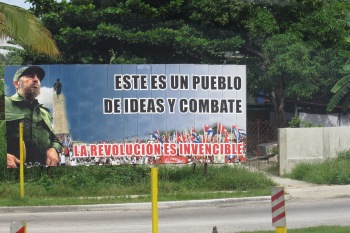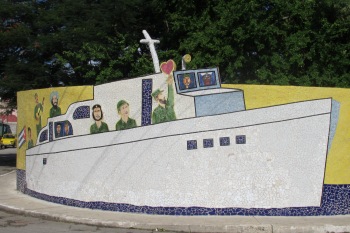A gaggle of U.S. tourists enters the physical therapy room of a nursing home in Havana. I glance to my right and, catching my eyes, an elderly woman asks, “Do you speak Spanish?” I tell her that I do, and with hope in her voice she inquires, “Did they lift the blockade?” My heart drops a little. No, I lament, they haven’t. A change in U.S. law now allows U.S. citizens to legally travel to Cuba on cultural and educational trips, hence my presence in her home, but the embargo still stands. We discuss her son living in Florida, the high cost of medicine and the injustice of the embargo, and I depart.
“For what I’m saying to you, they could call me a counterrevolutionary and throw me in jail for ten years,” he tells me. Part of me wonders then as to the wisdom of his decision to open up to a relative stranger. But there is nothing particularly incendiary about his comments. Merely discussion about the economic situation. How one cannot make enough money to cover expenses, let alone save money. How the increase in tourism plus the policy of allowing family businesses to open that cater to tourists is creating a growing class divide. How the leaders are corrupt, or in his words, are “friends helping one another out” at the expense of the average Cuban.
I want to write about my recent trip to Cuba while acknowledging I am far from being an expert and was only there for eight days. Similarly, I seek to avoid generic platitudes about the pride or resilience of the Cuban people, or to lay blame for the current situation solely at the feet of either the U.S. or Cuban governments. Like Silvio above, I wonder what adjectives, harmonies and stories to use to do justice to describe the country.
Getting off the plane in Cienfuegos, I naively held an expectation of feeling different. Here I was in Cuba, after all, this quasi-forbidden place, this thorn in the side of U.S. imperialism in Latin America, the land of the victorious revolution of Che and Fidel. But no, not being overcome with ecstatic revolutionary glossolalia, I was still me, just in another country, going through customs, getting on the bus and going to the hotel.
Given the Spanish colonial influence which permeates much of Latin America, Cuba felt familiar though I had never been there. Beautiful but beleaguered architecture lines impeccably clean streets largely empty of traffic. Music wafts from plazas, restaurants and homes. Surrealist sculptures compete for real estate with busts of José Martí. The Cuban people I met were friendly and welcoming, displaying that knack which so evades many in the U.S. of distinguishing between the people of a country and its government. Despite more than a century of treacherous U.S. policy towards Cuba, and fifty-five years of blockade and embargo, people were largely optimistic and encouraged regarding the recent diplomatic opening between the two countries.
 One thing Cuba does is challenge the conceptualization of poverty as understood from a capitalist perspective. In the U.S., poverty manifests as homelessness, debt, food insecurity, unemployment, lack of access to adequate services, etc. In Cuba, the minimum wage is $15 USD a month, the maximum is around $70 USD a month. (This leaves out those who earn from the tourist industry or the black market.) So according to capitalist standards, Cubans live in extreme poverty. Yet there is no homelessness (94 percent of Cubans own their homes), there is free education through the doctorate level, free healthcare, and some extremely subsidized food staples. Culture is a government priority, with performances and shows accessibly priced and artists and musicians paid by the state. Yet $15 doesn’t go very far, and unsubsidized goods, including basic foods, are quite expensive. This is most certainly exacerbated by the U.S. embargo, but also by Cuban government policies such as the dual currency system, which privileges tourists and renders certain products and activities outside of the reach of the average Cuban. Life is not easy. The sign on the side of the road proclaims “The Revolution is Invincible.” That remains to be seen, but the revolution does strike me as being weary.
One thing Cuba does is challenge the conceptualization of poverty as understood from a capitalist perspective. In the U.S., poverty manifests as homelessness, debt, food insecurity, unemployment, lack of access to adequate services, etc. In Cuba, the minimum wage is $15 USD a month, the maximum is around $70 USD a month. (This leaves out those who earn from the tourist industry or the black market.) So according to capitalist standards, Cubans live in extreme poverty. Yet there is no homelessness (94 percent of Cubans own their homes), there is free education through the doctorate level, free healthcare, and some extremely subsidized food staples. Culture is a government priority, with performances and shows accessibly priced and artists and musicians paid by the state. Yet $15 doesn’t go very far, and unsubsidized goods, including basic foods, are quite expensive. This is most certainly exacerbated by the U.S. embargo, but also by Cuban government policies such as the dual currency system, which privileges tourists and renders certain products and activities outside of the reach of the average Cuban. Life is not easy. The sign on the side of the road proclaims “The Revolution is Invincible.” That remains to be seen, but the revolution does strike me as being weary.
Which leads me to reflect that as impressive as the materialist gains of the revolution are, they leave much to be desired. Well-being is the meeting not just of material needs but also political, social, cultural and spiritual ones. And not just of the collective, but of the individual. Cuban policies lean hard towards the meeting of material and collective needs. This is admirable and commendable and no small task. The social supports in place in Cuba are remarkable. And who knows what Cuba could achieve were the embargo to be lifted. I would simply posit that it is not enough.
Authoritarian structures, whether capitalist or socialist, are an anathema to well-being in the holistic sense. One party rule, the lack of certain freedoms of speech, press and assembly, the creepier aspects of the Committees for the Defense of the Revolution, all serve as impediments to well-being. The retort of, “Would you rather have freedom of speech or freedom from hunger?” is a false binary. I would choose both, or rather a situation where there was no state that had the power to bestow upon or limit the freedoms of the populace to begin with.
But I’m not interested in drifting into a full-on polemic. Needless to say, the situation in Cuba is nuanced and complex and I am grateful for the opportunity to immerse myself in it for a few days. One thing is that is resoundingly clear is that the U.S. embargo and its belligerent policies towards Cuba must end. The decades-long attempt at destroying the Cuban economy and holding 11 million people hostage to an outdated, Cold War, imperialist policy is shameful and a failure. One person I met consistently said, “This is Cuba, nothing is impossible.” The achievements and survival of the past fifty-seven years of revolution give resonance to that statement. The fall of the embargo would be another such moment. May it happen soon.

